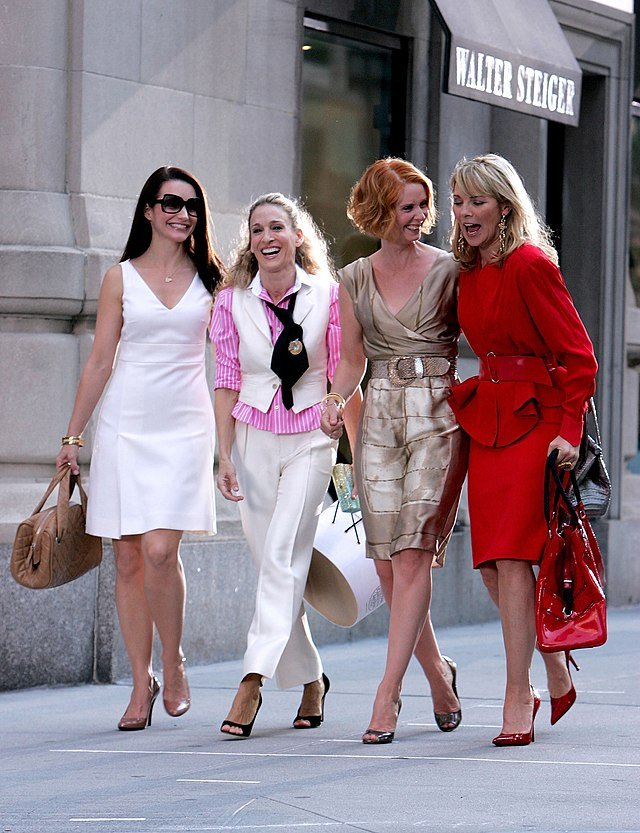Can We Safely Describe Sex and the City as Feminist?
Courtesy of Wikicommons
And just like that, we are living at a time where the Sex and the City reboot is one of the hardest experiences we had to witness in 2023. And the only reason it wasn’t too painful was because we (spoiler alert!) were given a glimpse of Samantha, in an HBO attempt to tease us into remaining for a new season. Personally, I was sold when Carrie was carrie(ing) the JW Anderson Pigeon clutch and living my dream.
In reflection of And Just Like That, the attention must be drawn to its roots, Sex and the City. With six successful seasons, the exceptional series has provided the foundations for dating, conversing and fashion curating for all fans since its conception in 1998. And, the show undoubtedly implemented a stage for independent women testing their prerogatives, but to what extent can Sex and the City be described as feminist?
Let us start with the star of the show: Carrie Bradshaw. There are a lot of phenomenal things to say about Sarah Jessica Parker’s character, like how she revolutionised the importance of the Manolo Blahnik Mary-Jane pumps for not only me, but for fashion-fans globally. Yet, there seems to be a lack of recognition for the multitude of mannerisms and actions that Bradshaw exercises that are plainly a manifestation of the male-gaze. A key example that cannot be ignored is the posture, eye-glancing and lip-biting that Bradshaw demonstrates as she calmly contemplates her daily column; I can’t name a single woman who not only bites her lip writing, but isn’t aggressively hunched over whilst she scrambles words on her google doc. Some could say this is a minute flaw in her characterisation, but paired with her wearing of couture in bed, cancelling on her friends for a man and being able to afford an apartment in the Upper-West side only further insults the already ridiculous expectations of women. As an audience, we can only sit, watch and contemplate the male-gaze that has a part to play in these tropes; does this patriarchal social-sphere really think women have the time, money and emotional availability to do these things? I guess the only real thing she ever did was have an affair with a married man and have to face the consequences…
Secondly, Miranda Hobbes: a Harvard-educated New York Lawyer from Connecticut. She acutely possesses one of the most cynical viewpoints on relationships with men since Athena turned Medusa’s hair into literal snakes. Yet the emotional roadblock of the red-headed icon is interestingly distinct in comparison to her friends; that being an unexpected pregnancy conjures the centuries’ old area of contention, abortion. This confrontation is followed by even harder questions: is this a matter of personal prerogative? Whilst we watch Miranda contemplate whether to tell the father of the baby, the narrative arguably contradicts the independence and self-security that Hobbes upholds, to possibly incur that motherhood is really for everyone, even if that means you will raise it alone and sacrifice your life’s work for it.
Onto Charlotte York (McDougal, and Goldenblatt): a truly hopeless romantic who effectively embodies the nuclear familial ideal as well as the American dream. And given the fertility issues that York faces that equates to the reality of many women, she is a direct contrast to her friend Miranda. And, there is no denying that a feminist lens would acknowledge the importance of appreciating a woman’s choice to hold her familial and traditional values dear to heart, and this may even negate any accusations of antifeminist tropes placed onto her character. But, the execution is somewhat lacking in stamina: as her friends encourage York to question these ideals, the narrative further incites the idea that the nuclear family is not up for question. Charlotte does indeed end up the happiest, arguably, so does this mean that for women to be happy we must subscribe to tradition also?
Now, last, but certainly not least in any way: Samantha Jones. Kim Cattrall, without any doubt, has gifted her audience one of the most iconic female characters in the history of television. The independence is contagious, her knowledge and power is exciting, but is her overall dependence on men (albeit sexual) and glamorisation of her lifestyle damaging? Now that we’re in 2024, the dialogue regarding sexual liberation is more active than ever. This discourse includes the dangers that come with the territory; sexual coercion, health risks, as well as the emotional indifference it conjures. So we could ask ourselves if Jones’ characterisation is just another classic attempt of the television industry fabricating a sexually liberated female character for all the wrong reasons, as well as for her only to be completely misunderstood.
With all this in mind, this specific discussion is not a call for Sex and the City to be remastered as a show with feminism constantly in mind. Its nature and production era was not one in alignment with current discourses. Yet, it is interesting to consider how the ones we may use as key reference could be just as flawed as the structures which created them. I guess we will have to rewatch to find out!

